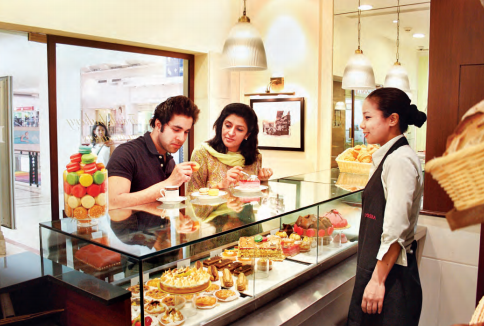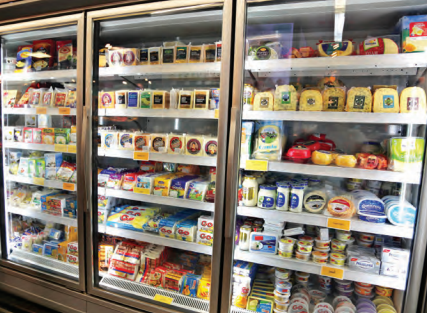Indo-French Food Processing Ties
Biz@India
March 2018
Indo-French food processing business relations remain one of their weakest links. Though there is scope for innovations, collaborations, technology transfers and expansions, the partnership is yet to unfold its full potential.
Economic and commercial linkages are an important component of the Indo-French bilateral relations. France is the tenth largest foreign investor in India with a cumulative investment of USD 5.82 billion from April 2000 to June 2017, which represents 1.70 pc of the total Foreign Direct Investment (FDI) inflows into India, according to statistics from the Department of Industrial Policy and Promotion (DIPP).
However, amongst these, FDI inflows in the food processing industry stand at just 5.38 pc, as compared to services sector (20.19 pc), and cement and gypsum products (16.48 pc).
According to Harsimrat Kaur Badal, minister of food processing, India, the Indian food processing sector would attract an investment of USD 14 billion over the next two to three years as committed by domestic and foreign investors during the World Food India (WFI) in November last year. “France, Germany, Netherlands, United States of America (US) and United Arab Emirates (UAE) have announced big amount of investments in areas of food processing, beverages, logistics, wholesale and retailing, e-commerce, and organic farming, among others,” she says.
During WFI, the Indian ministry of food processing pulled out all the stops to convince foreign investors that food processing can be the next big sunrise sector in India, if only it could attract the necessary capital.
Having significantly grown its agricultural, dairy, meat and horticultural produce, India as a food surplus nation offers raw material for global food processing giants. However, in the last five years, the industry contributed as little as 1.5 pc to the country’s Gross Value Added (GVA), and saw exports shrink from USD 36 billion to USD 31 billion.
On the other hand, France remained at the top of the Food Sustainability Index (FSI), with high scores across sustainable agriculture, nutritional values, and less food loss and waste – according to a report by The Economist Intelligence Unit with the Barilla Center for Food & Nutrition Foundation (BCFN) in December 2017.

French brands like L’Opera, Danone, and various wine companies are increasingly introducing the French way of baking and consuming
Collaboration Opportunities Amidst Challenges
The Indian food industry is poised for huge growth, increasing its contribution to world food trade every year due to its immense potential for value addition, particularly within the food processing industry. The industry accounts for 32 pc of the country’s total food market, and is ranked fifth in terms of production, consumption, export and expected growth.
However, though India is producing a lot, food processing comes with its own set of challenges. “India is one of the front runners when it comes to production, consumption and export of food products in the world, with a USD 6 billion retail sector out of which 70 pc is food, which is said to further increase by 2020. As of today, a big producer like India processes only 10 pc of what it produces and smaller countries like Malaysia and Indonesia process almost 70-80 pc of what they produce,” Badal told Biz@ India. “By 2020, the demand for food will increase by 20 pc. To stop food wastage we must ensure value added food processing,” she adds.
The Indian government has doubled the budget outlay for the food processing ministry to INR 14 billion (EUR 174 million) for next fiscal and the amount would be used to improve infrastructure at farm-gate level along with preservation and processing of perishable fruits and vegetables to reduce wastage and double food processing level to 20 pc. Currently, India is estimated to lose fruits and vegetables worth millions of dollar in the absence of adequate food processing infrastructure and cold storages.
On the contrary, in terms of innovation and technologies, France is a leader in building equipment for food processing companies. Various French companies specialise in cold chain, packaging solutions and many food processing sectors including dairy, bakery, meat, grains processing, fruit and vegetable processing.
As leaders in food processing technology, France can avail the opportunity to enhance trade relations between the nations by offering India latest technologies, quality mechanisms and safety standards; under the on-going cooperation between the two countries through the Indo-French Joint Working Group on agriculture that includes strengthening postharvest management capacities, vineyards, research and training and exchange programmes, animal identification and tracking, and genetic improvement of dairy cattle/breeds.
Eyeing the opportunity, a French company, is set to establish high yielding apple plant nursery in Kashmir in north India. The nursery will be based on high value genetic stock, suitable to the climate of Kashmir through a tie up with a local entrepreneur.
The company gave a detailed presentation on the proposed programme to the director of horticulture, Kashmir. The Indo French collaboration aims to put all efforts with its expertise in establishment of fruit plant nurseries, together with research and development facilities to pass on the benefits of high standard fruit plant production to the farming community in Kashmir.
With abundant agricultural supply at a low price, diversification of agricultural production that can be transformed, and possibility of selling not only in the Indian market but also exporting to the Middle-East or south-east Asia, India offers various advantages in investment, which are making some French companies consider re-entering India.
Approximately after four years it exited the Indian market, French retail major Auchan Group is now keen to return if the government allows ‘food plus’ in Foreign Direct Investment (FDI) in retail, and FDI norms are relaxed.
In February 2016, the Indian government opened food trading sector to foreign investment, with up to 100 pc FDI, drawing little interest from international retail players according to whom, just having food only stores was not a viable option. Thus, Auchan ended its partnership with Max Hypermarket India on account of the difficulty in complying with India’s foreign investment rules.
According to the retail chain, the percentage of ‘food plus’ needs to be decided first, as it would not make sense to start retail chains if it is less than 25 pc. The company is not willing to just sell food products while big Indian retailers next door are selling everything, from a pack of biscuits to flat-screen televisions. “To begin with, at least some fast-moving consumer goods and kitchen products should be allowed at our stores,” the company states. Moreover, the Indian government is considering allowing only ‘Made in India’ products in the stores.
What’s on the Shelf?
The changing Indian lifestyle is creating a multitude of opportunities for market players across industries – processed and frozen foods are amongst them.
Catering to preferences and willingness to spend more on new items, shelves in Indian supermarkets are being packed with an array of processed and frozen foods – boxes of breakfast cereals, cheese, olives, flavoured yoghurt, canned fruits, bottled juices, candy racks, sundried fruits, and much more.
Though French brands like L’Opera, Danone, and various wine companies are increasingly introducing the French way of baking, and consuming; and are eyeing expanding their footprints in India, there is not much on shelves.
Not many French players have yet entered the Indian market apart from some like Danone and Lactalis. Danone recently made an exit in its dairy business in India to instead focus on boosting its nutrition segment in the country, which is more than 90 pc of the business.
The company’s dairy portfolio in India including items such as dahi (yoghurt), mishti dahi (sweet yoghurt), flavoured yoghurts; while its UltraHigh-Temperature (UHT) processing portfolio comprising milk, buttermilk, cold coffee and smoothies, were making minimal contributions to the company’s annual revenue.
The company is now solely focusing on its nutrition portfolio, where it offers products under different brand names such as Protinex, Farex and Dexolac, and aims to double its nutrition business in India by 2020.
The company also experimented with other means to expand its business in India, aiming to buy Indore-headquartered Anik Industries’ dairy business. However, Danone lost out on that acquisition to fellow French dairy major Groupe Lactalis, which is actively scouting for more acquisition opportunities in India.
Danone also plans to expand its product Yakult, under Yakult Danone India – a joint venture between Japan based Yakult Honsha and Danone, which is aiming for presence in 60 cities by the end of this year. “We are trying to launch our products in Tier-II and Tier-III cities this year. Currently, we are present in 40 cities but are going to expand it to more than 50-60 cities during 2018-19,” says Minoru Shimada, managing director of Yakult Danone.
Since its entry in 2008, the company had only one product – Yakult Original, and a few days ago added Yakult Light to its portfolio. In 2017, it sold 186,000 bottles per day in India and in January this year augmented its manufacturing capacity to 270,000 bottles a day. “In future when customer demand will increase more and more, we will have a plan to establish another factory in India. Our production has to reach 700,000-900,000 bottles per day then we can consider another facility in the country,” Shimada adds.
Besides investments and collaborations, the food processing sector also holds potential to generate more employment opportunities in India. Yakult-Danone India has a direct selling distribution channel called Yakult Ladies System – with 260 women at present and plans to scale it up. “We will increase the number of Yakult Ladies in India to meet customer demand. We are going to purchase more refrigerated vehicles and are appointing more sales staff to distribute products to more stores and outlets in different cities,” Shimada says.
With a highly evolved food and beverage industry, France can leverage its expertise profitably by investing in India’s fast growing food processing industry. With several French companies having interest in investing or exporting in India in the long run, the food processing industry stands a good chance of attracting a valuable partnership for bringing about a transformational change in the sector.











